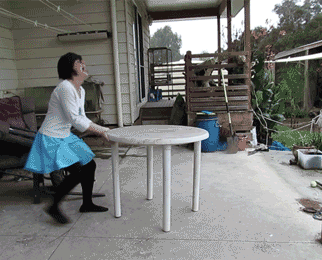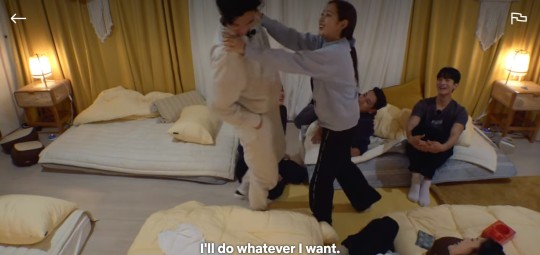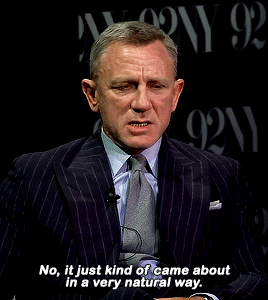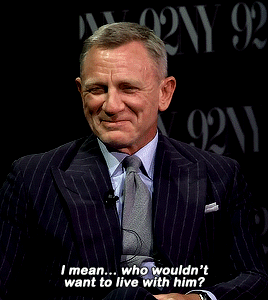Text
"Kill yourself" is basic. "May your favourite show be cancelled by Netflix before it has had the chance to tell its full story." It's smart. It's possible. It's terrifying
2K notes
·
View notes
Text
they discontinued 1899, but there's most likely going to be a second a third season of wednesday. i'm telling you, if it's not 'editable' for tiktok, it's automatically a flop. people don't want content that makes you think anymore, they want cool scenes they can slap an overplayed song and cheap filter over, so that their brains don't shortcut when it's presented with content not compressed into something easily digestible. god, i hate it here
720 notes
·
View notes
Text
every single production should have dialogue in 8 to 10 different languages if you ask me
2K notes
·
View notes
Text
I cross the street without an arm to hold me back - Rufus Emeterio
this line broke me. this is the saddest sentence I have read in my entire life.
112 notes
·
View notes
Text
patroclus not knowing his athletic rank because he's always with achilles who is literally the physical golden child and then being confused when he wins fights because achilles always beats him at everything but that's the only comparison he has
282 notes
·
View notes
Text
The Single Inferno panel comes together every episode to tell us exactly what we’ve seen.
16 notes
·
View notes
Text
Live footage of me when So-e didn't pick Se-jun to go to paradise with her:

41 notes
·
View notes
Text


90% of the girls in love with jinyoung when sejun is the best guy on this show? a shame
57 notes
·
View notes
Text
It’s a crime they typecast Daniel Craig as a serious action man for so long when it’s clear he was born to play a silly little gay detective
46K notes
·
View notes
Text
love love love that the guy who carried around a gun on his waist everywhere he went cause "you never know when shit's gonna go down" did not carry an epipen for his lethal food allergy
61K notes
·
View notes
Text
I think the cool thing about Benoit Blanc is how he is never, in his mind and on screen, the hero. He is the helper. He puzzles things out. But as he tells Helen, there's a limit to what he can do.
Actually, no, that's not even true. He COULD have blown up the house with Klear himself. He COULD have proved Ransom was responsible without also proving to Marta that she is, in fact, a good nurse. But it was Helen's vengeance to take, and it was Marta's house to claim, and he knows that he's a guest in their stories.
31K notes
·
View notes
Photo




Was Benoit’s sexuality ever discussed in the first Knives Out movie?
34K notes
·
View notes
Text
Benoit Blanc, entering the tardis for the first time: now mr doctuh… when you said it were bigguh on the insahd.. i mistook that fowuh a jest… but it seems thayut said blue box is, if my own eyes do nawt decieve me, indeed bigguh on the insahd
17K notes
·
View notes
Text
i just watched glass onion and just so we're all on the same page- miles bron = Elon musk. right?
13 notes
·
View notes
Text
Bond girls are out. Blanc girls (underprivileged women who screw over rich assholes with the help of this silly detective) are in.
81K notes
·
View notes
Text
Gender in Killing Eve and Hannibal (TV Series)
WARNING: LONG TEXTPOST!!!
(pls tell me ur thoughts)
Both Killing Eve and Hannibal feature characters who perform gender (or don’t) in particularly interesting ways. Killing Eve’s subversion of female gender roles is rich and complex, especially for a crime drama - a very male dominated genre. In crime shows, female characters are typically either non-existent, or badly written props for insufferable male protagonists.
The women of K.E. (namely Villanelle and Eve) are not only extremely intelligent and driven, but have a sensitively-described moral greyness. It is fascinating to see both women’s moralities evolve throughout the series, especially in relation to each other.
There are consequences to their actions, but the writers allow them to do bad things, to be bad people. It is refreshing to see ‘strong women’ written in this way: they don’t have to make women look ‘good.’ Often this moral flexibility is only tolerated from male characters.
That’s not to say that Villanelle and Eve are never vulnerable. They are people: their worth as characters cannot be based on filling the age-old mold of cold, dull, emotionless male detective characters. Eve is manipulated by her employers, by Villanelle, affected by the death of her friends, and is a victim to her own guilt. Villanelle, similarly, is subject to the needs of her employers, is orphaned, and is overall dysfunctional.
This inhibits their control of their own situations. But both characters make decisions, and take power for themselves. And while their intentions are muddied along the way, they both keep fighting for something, even if it’s just for themselves and each other.
The two central characters of Hannibal, Will Graham and Hannibal Lecter, exhibit a similar relationship to that of Eve and Villanelle. While they (Will especially) don’t flout the rules of gender as decisively as Villanelle, for example, they also are not typical male crime protagonists.
Will Graham is vulnerable, quiet, and uncomfortable with power. And, unlike other male underdog characters, this isolation isn’t resolved by, or blamed on a woman. These descriptors apply most obviously in the first season, but even through Will’s development, he doesn’t exactly become masculine or powerful (at least in the traditional way.) He is consistently affected by mental illness, which is sensitively depicted, and (character-wise) is sympathetic to other mentally ill characters. This is a point of weakness which is constantly exploited by other characters such as Jack and Hannibal.
Hannibal, on the other hand, is not very vulnerable (until he becomes more sympathetic to Will.) He is always in control, always able to manipulate the situation to his advantage. But even he isn’t exactly masculine. He enjoys art and music, and even through murder, is opulent and flamboyant.
This is easily comparable to Villanelle’s (fashion, visuals, performance)
Both Hannibal and Will are very clearly queercoded, and in a relationship that can’t really be described as platonic. Scenes with them are written, acted, and framed in an intimate way. Even when stabbing each other, there is romantic tension. This is a union between two people who understand each others’ deepest, most hidden nature.
I am hesitant to compare murder entirely to queerness, because of how this has been used to suggest evil inherent to queer people. But murder, and wanting to murder, is sensitively and subtly compared to the way queerness is viewed by society, and to an extent how it can be experienced by queer people and their own self-discovery. The way both characters talk about murder is intensely intimate. And Will’s development as a murderer, and someone who understands murder, is parallel to his evolving relationship with Hannibal.
Villanelle and Eve are canonically bisexual, and have scenes that are clearly romantic. They share a similarly obsessive relationship. It is endlessly entertaining to watch this relationship play out. It is infinitely toxic, as opposed the clean, unpassionate lesbian romances we’re used to seeing on TV. It’s also not an oversexualised, voyeuristic male fantasy.
TV writers need to stop avoiding making queer characters that are bland, moral, nice and boring for fear of making something problematic. That’s just lazy writing, and it’s up to them to write these characters well. I am tired of clean, easy ‘girl power’ types, or tick-box diversity.
Another interesting facet of gender performance in the two shows is fashion and costume design. In particular, Villanelle’s penchant for two or three piece suits is considerably masculine, but not a masculinity typically performed by men in crime shows. She chooses fashion outside of the default, minimal idea of masculinity, and embodies gender performativity.
However, Villanelle is just as likely to wear overly feminine clothing (eg. pink tulle dress, black tulle dress) in a way that is just as deliberate and theatrical. She is fully aware of herself and how she is perceived, and is able to manipulate and enjoy it. This is an especially enjoyable rebuttal to the ‘beautiful but doesn’t know it’ trope, which I despise. Her self-confidence is not granted by a man: she seizes it herself.
Eve is almost the opposite of this. She wears very neutral, almost utilitarian clothing throughout the show, and rarely considers what she wears, except when she has to. But this doesn’t give way to the aforementioned display of female insecurity. Both women show a performance of womanhood that is unconventional on TV. What I think causes this is that the male gaze is rarely applied to either woman.
Will and Hannibal have somewhat of a similar visual comparison to Eve and Villanelle, simply: Hannibal is very attentive to his clothing, Will, for most of the series, is not. Hannibal, despite dressing in typically masculine clothing: three piece suits, does it much more deliberately and precisely than many masculine male TV characters. Will’s clothing is perhaps a choice, less by him than the writers, to make him seem unthreatening and unaware. This changes in the third season when Will begins to wear fitted suits, and seems to brush his hair more often.
Some interpret this as Will mirroring Hannibal, but it could be read as Will rivalling Hannibal. Hannibal was able to, quite literally, keep up appearances of himself as competent, sane and respectable. He asserts himself as Will’s superior. However, Will understands that maintaining his appearances is beneficial to him, and shows the viewers, and Hannibal, that he understands the way he works. He is, by season three, no longer a vulnerable stray, but not a ruthless, efficient killer.
Both series display complex, well written characters: and this is their strength. But I do wish the writers of Hannibal had developed their female characters better.
353 notes
·
View notes

